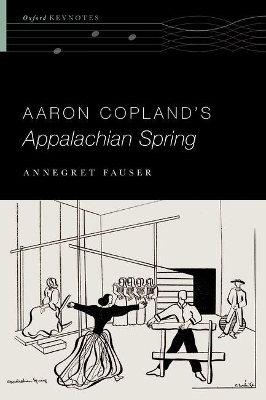
Aaron Copland's Appalachian Spring
Seiten
2017
Oxford University Press Inc (Verlag)
978-0-19-064686-8 (ISBN)
Oxford University Press Inc (Verlag)
978-0-19-064686-8 (ISBN)
Appalachian Spring, with music by Aaron Copland and choreography by Martha Graham, counts among the best known American contributions to the global concert hall and stage. Distinguished musicologist Annegret Fauser offers a concise and lively introduction to the history of the work, its realization on stage, and its transformations over time.
Appalachian Spring, with music by Aaron Copland and choreography by Martha Graham, counts among the best known American contributions to the global concert hall and stage. In the years since its premiere-as a dance work at the Library of Congress in 1944-it has become one of Copland's most widely performed scores, and the Martha Graham Dance Company still treats it as a signature work. Over the decades, the dance and the music have taken on a range of meanings that have transformed a wartime production into a seemingly timeless expression of American identity, both musically and visually. In this Oxford Keynotes volume, distinguished musicologist Annegret Fauser follows the work from its inception in the midst of World War II to its intersections with contemporary American culture, whether in the form of choreographic reinterpretations or musical ones, as by John Williams, in 2009, for the inauguration of President Barack Obama.
A concise and lively introduction to the history of the work, its realization on stage, and its transformations over time, this volume combines deep archival research and cultural interpretations to recount the creation of Appalachian Spring as a collaboration between three creative giants of twentieth-century American art: Graham, Copland, and Isamu Noguchi. Building on past and current scholarship, Fauser critiques the myths that remain associated with the work and its history, including Copland's famous disclaimer that Appalachian Spring had nothing to do with the eponymous Southern mountain region. This simultaneous endeavor in both dance and music studies presents an incisive exploration this work, situating it in various contexts of collaborative and individual creation.
Appalachian Spring, with music by Aaron Copland and choreography by Martha Graham, counts among the best known American contributions to the global concert hall and stage. In the years since its premiere-as a dance work at the Library of Congress in 1944-it has become one of Copland's most widely performed scores, and the Martha Graham Dance Company still treats it as a signature work. Over the decades, the dance and the music have taken on a range of meanings that have transformed a wartime production into a seemingly timeless expression of American identity, both musically and visually. In this Oxford Keynotes volume, distinguished musicologist Annegret Fauser follows the work from its inception in the midst of World War II to its intersections with contemporary American culture, whether in the form of choreographic reinterpretations or musical ones, as by John Williams, in 2009, for the inauguration of President Barack Obama.
A concise and lively introduction to the history of the work, its realization on stage, and its transformations over time, this volume combines deep archival research and cultural interpretations to recount the creation of Appalachian Spring as a collaboration between three creative giants of twentieth-century American art: Graham, Copland, and Isamu Noguchi. Building on past and current scholarship, Fauser critiques the myths that remain associated with the work and its history, including Copland's famous disclaimer that Appalachian Spring had nothing to do with the eponymous Southern mountain region. This simultaneous endeavor in both dance and music studies presents an incisive exploration this work, situating it in various contexts of collaborative and individual creation.
Annegret Fauser is Cary C. Boshamer Distinguished Professor of Music at UNC Chapel Hill. Her research focuses on music of the nineteenth and twentieth centuries. Her recent book, Sounds of War: Music in the United States during World War II (OUP, 2013), was awarded both the Music in American Culture Award of the American Musicological Society and an ASCAP Deems Taylor Award.
Acknowledgments
About the Companion Website
Archives and Sources
Introduction: Appalachian Connotations
Chapter 1: A Commission and Its Context
Chapter 2: The Creation of a Dance Piece
Chapter 3: Appalachian Spring Performed
Chapter 4: Americana between War and Peace
Chapter 5: An American Icon
Additional Sources for Reading and Listening
| Erscheinungsdatum | 26.03.2018 |
|---|---|
| Reihe/Serie | Oxford Keynotes |
| Zusatzinfo | 8 halftone, 4 line art |
| Verlagsort | New York |
| Sprache | englisch |
| Maße | 211 x 145 mm |
| Gewicht | 283 g |
| Themenwelt | Kunst / Musik / Theater ► Musik ► Musiktheorie / Musiklehre |
| Kunst / Musik / Theater ► Theater / Ballett | |
| ISBN-10 | 0-19-064686-1 / 0190646861 |
| ISBN-13 | 978-0-19-064686-8 / 9780190646868 |
| Zustand | Neuware |
| Haben Sie eine Frage zum Produkt? |
Mehr entdecken
aus dem Bereich
aus dem Bereich
Grundbegriffe, Harmonik, Formen, Instrumente
Buch | Softcover (2021)
Philipp Reclam (Verlag)
CHF 12,90
Jazz als Gegenkultur im westlichen Nachkriegsdeutschland
Buch | Hardcover (2024)
edition text + kritik (Verlag)
CHF 57,90


